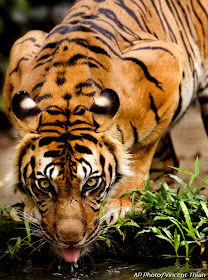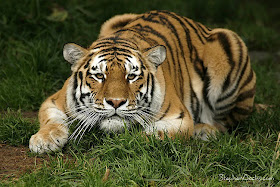 Tiger Photo
Tiger Photo
 Tiger Hunting Video Pics
Tiger Hunting Video Pics
 Tiger Video Gallery Picture
Tiger Video Gallery Picture


 How Are Tigers Unique? :
How Are Tigers Unique? : Tigers, Panthera tigris, are the biggest cats of all, and they're the only large cats with stripes.
Most other members of the feline family are small, weighing 20 kg (44 lb) or less. Only lions and tigers reach weights of 225 kg (500 lb).
Once, eight subspecies of tigers roamed the forests of Asia. Now there are only five. Bali, Javan, and Caspian tigers were driven to extinction in just the past 50 years.
Growing Up Against the Odds - Danger awaits young tigers at every turn. Even under the best conditions, only 20 percent live to establish their own territories. But tigers are adapted to offset such high natural mortality: Females breed early, deliver cubs after just 103 days, and bear litters of two to four cubs.
Tigers Are Built for Predatory Life -
Dagger-sharp claws, enormous jaws and teeth, massive forelegs-in an instant, all are in motion to deliver a killing bite. An experienced adult can kill prey four times its size.
What Hope for the Tiger? - Mysterious, powerful, majestic--the tiger stands tall in our imaginations.
But, in truth, tigers are disappearing in the wild. Just a century ago, an estimated 100,000 tigers inhabited the forests of Asia. Now scarcely 6,000 remain, and soon this magnificent cat may only exist in zoos.
Do tigers have a chance? Only if people living near reserves believe that a live tiger is more precious than a dead one.
Tigers and Humans: Colliding Worlds - Civilization hems in the tiger. Whole forests have fallen across Asia in the last century, shrinking potential tiger habitat to about 170 small fragments of land in 14 countries. Some pockets contain breeding tigers. But most areas are so small and isolated that if any tigers remain, they probably won't survive.
Tigers and Humans: Competing for Resources - The pressing need for food and fuel often pits Asia's human population against the tiger.
Where public land is degraded, people slip into reserves to graze animals, collect firewood, and kill the tiger's prey. Poachers have taken thousands of tigers to supply bones and other parts for traditional medicines.
Living near reserves takes a toll on people, too. Park animals destroy crops, tigers kill livestock--and, sometimes, people.
Scientists: On the Trail of the Tiger - You can't save an endangered animal like the tiger without knowing what it needs to survive.
Fortunately, in the last 25 years, four long-term, in-depth studies have revealed much about how tigers interact, what factors shape their lives, and what makes them succeed--or fail--at finding new places to live in the face of declining habitat. Such information is critical to international efforts to save the tiger.
Local People: Making Room for Tigers -
Many villagers living near Royal Chitwan National Park in Nepal now have a stake in the tiger's future.
In 1995, Nepal's legislature passed a law giving half the revenues from protected lands to local development. In addition, part of the park's degraded buffer zone came under local control. With an eye to tourism, villagers fenced off one area and allowed it to regenerate. Gradually, wildlife, including the tiger, recolonized.
In 1996 alone, ecotourism revenues from the project built a health unit and three schools.
 Lion Close-up Photo
Lion Close-up Photo Sleeping Lion Free Pics
Sleeping Lion Free Pics Lions - Lion Group Photo
Lions - Lion Group Photo Lion With Cubs Picture
Lion With Cubs Picture Lion - Tiger Picture
Lion - Tiger Picture White Lions Free Pics
White Lions Free Pics Lions Photograph - Free Wallpaper
Lions Photograph - Free Wallpaper Lions Drinking Water - Animals
Lions Drinking Water - Animals Lion with Baby Pics
Lion with Baby Pics Lion Black and White Photograph
Lion Black and White Photograph Lion with Baby Lion
Lion with Baby Lion Baby Lion Cute Pics
Baby Lion Cute Pics





































